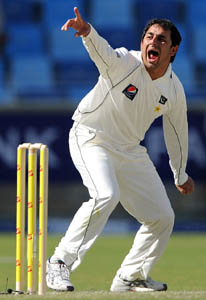You can now include 2012 alongside 2011 and 2009 as historic moments in Pakistan cricket, but for such very different reasons than the turmoil that came before. It was March 2009, in Lahore, that the Sri Lanka team was attacked by gunmen while driving to a match.
The security threat forced the ICC to withdraw any rights Pakistan had of hosting cricket until the situation improved. To this day, they have not played an international match on home soil, with the team testing various options before adopting the United Arab Emirates as its home away from home.
Cricket in Pakistan was again left in turmoil late in 2011, when former skipper Salman Butt and fast bowlers Mohammad Asif and Mohammad Amir were accused and later found guilty of spot-fixing during their Test series against England. Many questioned whether this was the beginning of the end for this troubled cricketing nation.
Pakistan cricket could have imploded. Instead, they have rebuilt.
With all that has happened, it will be a long time before fans right round the globe put their trust back in Pakistani cricket. But the newly-completed whitewash victory over the number one Test nation, England, will go a long way to improving the mood.
Pakistan were about to face the acid test. England had not lost a series in three years, and Pakistan was untested against elite teams.
England brought a seam attack overflowing with talent, a world-class off spinner, and four batsmen in the Test top 11. Anyone who dared predicted a three-nil series result in favour of Pakistan would have been laughed out of town.
Wickets were thrown away, crucial catches dropped, and numerous DRS reviews wasted, yet whenever it was truly needed, someone took the initiative and stepped up to perform.
Remarkably quickly, Pakistan developed a psychological hold over the English batsmen throughout the demolition. It was highlighted by the second-innings collapse during the second Test, when England were set just 145 for victory to level the series, but were sent on their way for 72.
It was that victory that really raised eyebrows as to whether this Pakistani team was the real deal. One Test could have been a fluke, but two in a row… What was in store? As we now know, they went on to emphatically whitewash England.
The forces behind the resurgence of Pakistani cricket included the likes of inexperienced batsmen Asad Shafiq and Azhar Ali, who showed poise well beyond their experience. But the real star of the show was spinner Saeed Ajmal, whose 24 wickets for the series epitomised a team very different from the norm for Pakistan.
Remarkably, Ajmal, now 34, had not played international cricket until the age of 30, but he has quickly made up for lost time by becoming the fastest Pakistani to 100 Test wickets, achieving it in only 19 matches. To make his achievement more remarkable, he has not played a single of his 20 Tests at home.
It is an astounding record.
Ultimately the roots of Pakistan’s revival must be traced to brilliant and effective leadership. Throughout the series, skipper Misbah-ul-Haq demonstrated his calm, controlled and patient approach to the game, and for this display of leadership he must be commended.
The PCB must now take heed of the leadership shown on-field, and show some themselves away from the pitch.
Pakistan is improving, and this victory is a clear message to all cricket-playing nations that they have the capability to take on any team in the world. The victory over England should be treated as a stepping stone to even bigger achievements.
Their aim must now be to build a consistent and stable team. It will take a lot of hard work to gain back the respect of the cricketing world, but this hard work will drive new generations to play cricket. And as we’ve seen, a strong Pakistan means excitement for the rest of us.









